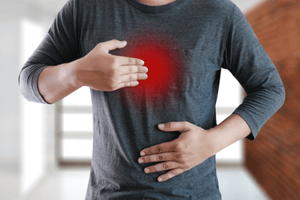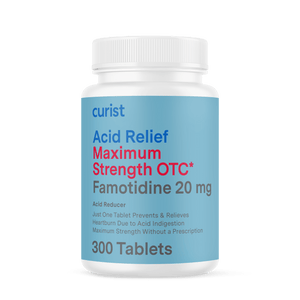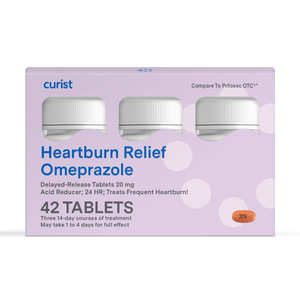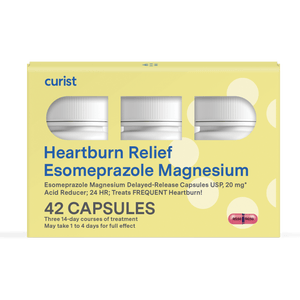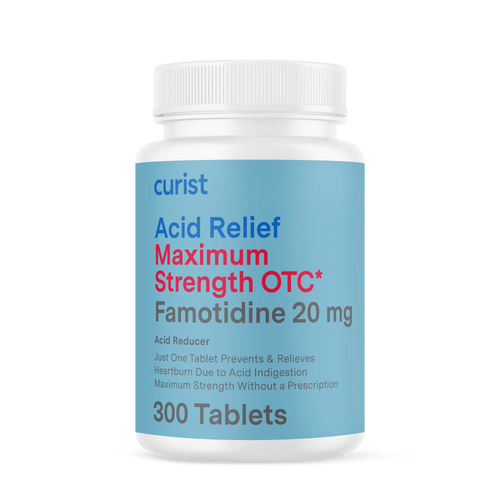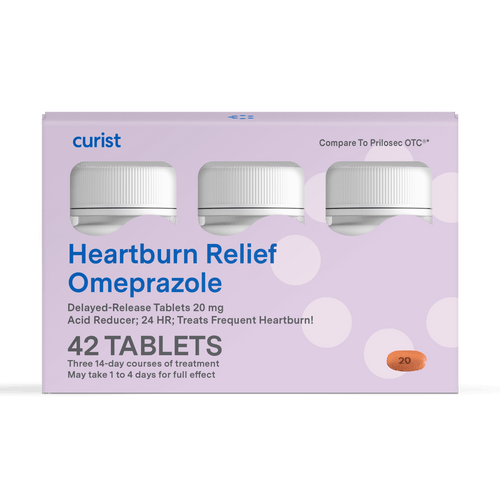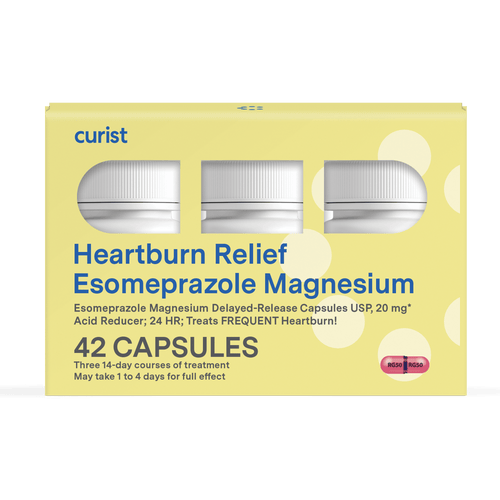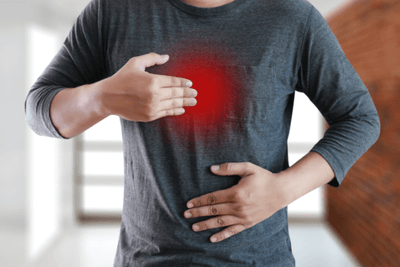Curist delivers over-the-counter medicines to your door at a fraction of the price of traditional brands. We hope everyone stays safe and healthy during this time.
What is Heartburn?
Heartburn is an uncomfortable, burning sensation or pain located in your lower chest (just behind your breastbone). This pain can radiate up into your chest, back, throat or neck. It often gets worse after eating (within an hour after meals), in the evening, when lying down at night or bending over. Sometimes, you can also experience a sour or bitter taste at the back of your throat.
What is Acid Reflux?
There is a valve - a ring of muscle known as the lower esophageal sphincter (LES) located at the entrance of your stomach. Normally, the LES closes as soon as food passes through it. If the LES does not close all the way or if it opens too often, acid produced by your stomach can move up into your esophagus and lead to the manifestation of heartburn. This condition is called acid reflux. Acid reflux can be ranged from mild to severe. If heartburn symptoms happen more than two times a week, this condition may be considered the severe form of acid reflux and is known as gastroesophageal reflux disease (GERD).
What is the Difference Between Heartburn vs Acid Reflux?
Heartburn is a symptom of acid reflux. Acid reflux is a medical condition or disease in which stomach acid flows backward into the esophagus, which is the tube that leads from the throat to the stomach. Acid reflux can sometimes progress to GERD which is the chronic form of acid reflux and is more severe. Heartburn is a feeling of burning in the chest, so it is a symptom of acid reflux and GERD.
5 Tips For Preventing Heartburn Without Medicine
Occasional heartburn is common but no cause for concern. Most people can manage the discomfort of heartburn on their own through lifestyle changes and over-the-counter medications. Here are some must-know tips to help you and your loved ones ease heartburn.
Tip 1 to Prevent Heartburn: Avoid smoking and alcohol
Both cigarette smoke and alcohol relax the muscle that prevents acid from backing up into the esophagus, so avoiding smoking and avoiding alcohol can actually reduce acid reflux.
Tip 2 to Prevent Heartburn: Maintain a healthy weight
Extra weight can put pressure onto the stomach and force more acid to back up into the esophagus, so losing weight may actually help reduce heartburn.
Tip 3 to Prevent Heartburn: Avoid foods that trigger your heartburn
Eat lighter meals. Avoid high-fat foods (eg. avocados, cheese), mint, citrus juices, chocolate, spicy foods, salt, onions, milk, carbonated beverages, etc. as they can relax the muscle and allow food to back up into the esophagus. Therefore, understanding which food triggers heartburn and avoiding them may actually help reduce symptoms.
Tip 4 to Prevent Heartburn: Don’t lie down
Avoid lying down after you eat. Wait for at least 3 hours. Our bodies are made to digest food in an upright position. Lying down soon after eating can make digestion difficult as food can potentially back up into the esophagus. So, allowing at least 3 hours for the stomach to properly digest can actually help reduce heartburn.
Tip 5 to Prevent Heartburn: Raise Your Head in Bed
Elevate the head of your bed by 6-8 inches or use a wedge pillow. Sleeping at an angle will help prevent acid from backing up into your esophagus. Raising your head with additional pillows is typically not effective as they only elevate your head and neck. These pillows may actually increase pressure on the stomach and make acid reflux worse. Therefore, elevating both your head and your torso is key to help reduce acid reflux.
Best Self-Treatment Medicine Options for Heartburn Relief
If the tips above are not enough to slow down or stop heartburn, some people turn to medicines designed specifically for treating acid reflux. These medicines can be very effective self-treatment options. There are 3 classes of over-the-counter medications indicated for treatment of heartburn.
Antacids (Eg. Tums®, Rolaids®): Used to treat mild, infrequent heartburn; It has a fast onset (within 30 minutes) but shorter duration (lasts for 60 minutes).
Histamine-2 Receptor Blockers (Eg. Pepcid®) - Used to treat mild, infrequent heartburn; It has a slower onset than antacids (within 90 minutes) but a longer duration (lasts for 540 minutes). H2 blockers can also be used with antacids to prolong heartburn relief. Most importantly, this class of medications can be used to prevent heartburn (especially when one can anticipate an event of heartburn).
Proton Pump Inhibitors (Eg. Omeprazole, available at Curist hereto learn more; Esomeprazole, available at Curist here) - Unlike antacids and H2 blockers which are designed to treat infrequent heartburn, PPIs treat frequent heartburn (occurs 2 or more days per week). Typically, PPIs are used daily and take 1-4 days for full effect and therefore are not intended for immediate relief of heartburn. This class of OTC medications are only intended for a 14-day course of treatment and can be used up to three times per year (every four months) as needed.
To learn more, check out our Esomeprazole FAQ and Omeprazole FAQ.



